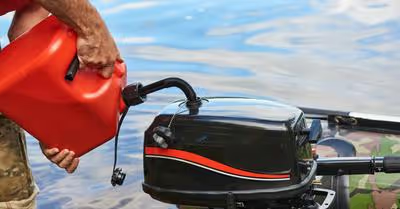
Key Takeaways
- Boat gas is usually the same as car gas, but some boats require higher octane fuels.
- Check your boat’s owner’s manual to ensure you’re using the right fuel.
- Some boats can also run on diesel, propane, and other types of fuel.
Fueling up your boat is a crucial part of just about every day on the water. Learn if boat gas is the same as car gas and more about boat fuel in this guide.
For all intents and purposes, boat gas is typically the same as car gas, and you can fill up your truck and your boat at the same time with no issues. The biggest thing to pay attention to is the octane rating, as sometimes boats require premium fuel (higher octane) than your vehicle will.
With a topic like this one that could potentially affect your boat, we know you want accurate information. To ensure this, we’ve not only used our own experience and knowledge, but we’ve combined it with lots of research and vetting of information. This way, you’ll know exactly what type of gas to put in your boat when you need to fill up/
What is Boat Gas?
Types of Boat Gas
Boat gas is the fuel used to power marine engines. Most boats use similar gasoline as cars, but there are a few crucial differences. Boat gas is available primarily in two forms: gasoline and diesel.
Gasoline is a refined product made up of hydrocarbons and is the most common fuel used in small boats. Diesel fuel, which is derived from crude oil, is typically used in larger boats and ships.
In some cases, you might encounter ethanol-based gasoline at marinas. It's essential to pay attention to the fuel's ethanol content because ethanol can lead to issues such as water absorption and corrosion in boat engines. It's crucial to use the right type of fuel for your specific engine and boat.
Gasoline Types
- Regular unleaded: A common fuel type for smaller boats
- Premium unleaded: Offers higher-octane levels, which can be beneficial for some boat engines
- Ethanol blended: Contains a certain percentage of ethanol, typically up to 10% (E10)
Diesel Types:
- Regular diesel: Used in larger boats and ships
- Biodiesel: A renewable fuel made from organic materials
Boat Engines and Fuel
Boat engines come in various types and sizes, and the fuel they require depends on their design and function. Most boat engines usually run on gasoline, while large boats and ships often use diesel fuel.
Old vs. New Engines
Older boat engines may not be equipped to handle ethanol-blended fuels, leading to engine damage or reduced performance. Newer engines are generally designed to work with ethanol-blended gasoline, but it's essential to consult your engine's manual for specific fuel requirements.
Boat Size
Boat size plays a significant role in determining the type of fuel used. Smaller boats typically use gasoline, while larger boats and ships often rely on diesel fuel for power. There are some exceptions, such as sailboats under 30 feet that may use diesel fuel instead of gasoline.
Remember to always consult your boat's manual or the manufacturer's recommendations when selecting the right type of fuel for your engine. By doing so, you can ensure your boat runs efficiently and safely while out on the water.
Boat Gas vs Car Gas: Is Boat Gas the Same as Car Gas?
When it comes to the fuel used in boats and cars, you might wonder if there's a difference between the two. In many cases, boat gas is usually the same as car gas, but there are some important exceptions to keep in mind.
Your car typically runs on unleaded gasoline, which is a refined product made up of a mixture of hydrocarbons. This same gasoline is also the most common fuel used in small boats. However, one key difference you might encounter is the octane rating of the gas.
Cars usually run on regular unleaded gas with an octane rating of 87, while some boats may require premium gasoline with an octane rating of 91 or higher. It's important to always follow your boat manufacturer's recommendations for fuel to ensure the best performance.
Another difference between boat gas and car gas is the presence of ethanol. Many cars can run on gasoline that contains up to 10% ethanol, while boats often prefer to use ethanol-free gasoline.
Ethanol can cause various issues for boats, including damage to the boat’s fuel system and reduced fuel efficiency. When fueling your boat, you should look for marine fuel or gasoline with a low ethanol content.
On the other hand, diesel engines are also common in larger boats and yachts. Diesel fuel, derived from crude oil, is different from gasoline used in cars and boats. It has a higher energy content, allowing for greater fuel efficiency and lower emissions.
However, it's crucial to only use diesel fuel in engines specifically designed for it. Additionally, boats may use off-road diesel, which is less refined and not intended for use in vehicles subject to road taxes.
In summary, while boats and cars often use similar fuels like gasoline and diesel, there are some differences in details, such as octane ratings and ethanol content. Always ensure you're using the appropriate fuel for your boat or car to maintain optimal performance and avoid any possible damage to the engine or fuel system.
What Happens if You Put Car Gas in Your Boat?
If you happen to put automotive fuel in your boat, don't worry too much. In many cases, boats and cars use the same gas. Most boats use unleaded gas, similar to what you would get at a regular gas station.
Certain boat engines, however, have specific fuel requirements, so it's essential to check the manufacturer's manual before filling up. Ethanol-free gasoline is generally preferred for boats, as ethanol can lead to problems with marine engines. If your boat engine is designed to handle ethanol, moderate levels of ethanol in gasoline should not cause issues.
It's important to be aware that some marinas offer "marine gas". Marine gas might have a few advantages over regular car gas, such as being ethanol-free or having added stabilizers that help the fuel last longer in storage. Nonetheless, if you accidentally use car gas in your boat, chances are you won't see any immediate problems.
Keep in mind that consistently using the wrong type of fuel can eventually lead to issues in your boat's engine performance. To avoid any potential problems, always use the recommended fuel type for your specific boat. By doing so, you'll ensure not only the longevity of your engine but also a smooth sailing experience.
Cost, Taxes, and More
When it comes to fueling your boat, you might wonder if there's a difference in cost between boat gas and car gas. The good news is, generally, boat fuel is the same as automobile fuel. However, there are a few factors to consider when comparing the costs.
Firstly, the price per gallon of gas can be higher at marinas than at your regular gas station. This is primarily due to supply and demand as well as the convenience factor of filling up your boat right at the dock. So, if you want to save some money, filling up your boat at a gas station before heading to the marina could be a more budget-friendly option.
Storage, Maintenance, and Care for Boat Fuel
Proper storage, maintenance, and care of your boat fuel are essential to keep your boat running smoothly and efficiently. Here are a few friendly tips on how to maintain your boat fuel in top condition.
When it comes to storage, keep your boat's fuel tank as full as possible to minimize condensation and air exposure. This helps to prevent water from mixing with the fuel, which can lead to engine problems. Additionally, choose a cool, dry, and well-ventilated area for storing fuel containers, away from direct sunlight or heat sources.
To maintain your boat fuel's quality, consider using fuel stabilizers, especially in ethanol-based fuels which are more susceptible to moisture absorption. Adding a fuel stabilizer before a long period of non-use helps to prevent fuel degradation and keeps your fuel fresh for the next boating season.
Simply follow the instructions on the product label to ensure you're using the right amount for your fuel tank size.
Regularly inspect your fuel tank, fuel tank vent system, fuel lines, and fuel injectors for signs of wear, corrosion, or damage. Be on the lookout for leaks, cracks, and loose connections. Promptly address any issues you find to avoid further complications down the road.
Furthermore, it's essential to replace your boat's fuel filters per the manufacturer's recommended intervals, as clogged filters can cause poor engine performance or even damage.
In summary, remember these key points for storage, maintenance, and care of your boat fuel:
- Store fuel in a cool, dry, and well-ventilated area
- Keep your fuel tank as full as possible to minimize condensation
- Use fuel stabilizers to prevent fuel degradation
- Regularly inspect your fuel tank, lines, and filters for signs of wear or damage
By following these guidelines, you'll be sure to enjoy smooth sailing and a well-functioning boat engine.
Alternatives to Boat Gas
If you're considering different fuel options for your boat, it's essential to know what alternatives are available. Here, we will discuss a few common types of boat fuel – diesel, propane, electric, and hydrocarbons – that might serve as suitable alternatives to traditional boat gas.
Diesel Boat Fuel
Diesel is a popular option for larger boats, especially those over 30 feet in length. Diesel is less flammable than gasoline, which makes it a safer option for boaters. Additionally, diesel engines are typically more fuel-efficient and require less maintenance than their gasoline counterparts. They can provide excellent torque and are well-suited for long cruises or in rough conditions.
Propane Boat Fuel
Propane is another alternative fuel used in some boats. It's an eco-friendly option, as it produces fewer greenhouse gas emissions than gasoline or diesel. Propane also tends to be more cost-effective, as it usually costs less than other fuel types.
However, keep in mind that propane requires a specific kind of engine, and the fuel storage system needs to be installed and maintained carefully to ensure safety.
Electric-Powered Boats
Electric boats are gaining popularity among boaters who prioritize sustainability. These boats use electric motors powered by batteries, which can be charged at home or by using solar panels. Electric boats are quiet and produce zero emissions, making them an excellent choice for those committed to reducing their environmental impact.
That said, electric motors may have limited range and power compared to internal combustion engines, so consider your boating needs and activities before going electric.
Hydrocarbons
Hydrocarbons refer to a variety of fuels derived from crude oil, such as gasoline and diesel. Although these are traditional options, some boaters might consider alternative hydrocarbon fuels like biodiesel and renewable diesel.
These fuels are derived from plant oils or animal fats, which help reduce greenhouse gas emissions and dependence on fossil fuels. They can be used directly in existing diesel engines without modifications, though availability and cost might vary.


